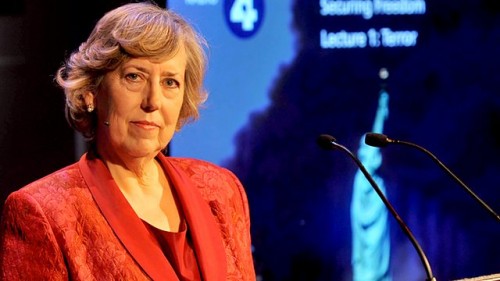 We were asked to listen to Eliza Manningham-Buller’s 3-part lecture series titled “Securing Freedom” as part of the terrorism course I’m taking right now. She’s a former head of MI5 (the U.K.’s FBI, more or less). Her talks were given as part of the 2011 Reith Lectures on BBC Radio 4. It’s a fantastic set of talks.
We were asked to listen to Eliza Manningham-Buller’s 3-part lecture series titled “Securing Freedom” as part of the terrorism course I’m taking right now. She’s a former head of MI5 (the U.K.’s FBI, more or less). Her talks were given as part of the 2011 Reith Lectures on BBC Radio 4. It’s a fantastic set of talks.
You can listen to or read them on the BBC Radio 4 website:
Listen Online: Part 1 – Terror, Part 2 – Security, Part 3 – Freedom
Download (MP3s): Part 1 – Terror, Part2 – Security, Part 3 – Freedom
Read (PDFs): Part 1 – Terror, Part 2 – Security, Part 3 – Freedom
She joined MI5 in 1974 and was Director General from 2002 to 2007. She knows the goings on of terrorism. She lived and worked in that world for over 30 years. Here positions and opinions have been thoughtfully cultivated during that career. A career in an organization that has been trying to grapple with terrorism for decades and has learned a great deal that the U.S. has chosen to ignore.
She presents an incredibly well spoken, calm, rational discussion on terrorism. There are some minor aspects of her talks that I disagree with, but even so I think she gives voice to a levelheadedness the world has been lacking.
I think the U.S. would be in a better place in terms of national security, civil rights, and human rights if we had some people like her over here running things.
I think her biggest point of departure from U.S. rhetoric is the acceptance that you can’t solve terrorism with the military alone. You can’t shoot your way to peace unless you’re willing to shoot every man, woman, and child who might ever disagree with you. And I’m not suggesting that we should do so. You have to make some effort at resolving the underlying dispute that has given rise to the violence. And I can already hear the disgusted remarks about how we don’t negotiate with terrorists. Which is the point. If you don’t you will never have peace. Negotiation doesn’t necessarily mean sitting down at a table and signing a peace treaty. But it should mean addressing root causes and trying to make potential terrorists feel like such actions are unnecessary.
I appreciate her adamant position that torture is unacceptable regardless of its efficacy simply because it is wrong to do that to another person. And, yes, sadly this means sometimes innocent people may be injured or killed. That’s the price a nation must pay in order to uphold the belief that all persons have a right to humane treatment.
I especially liked her discussion about how an intelligence organization can operate effectively in balance with civil rights. There is a need for oversight and perhaps you shouldn’t give intelligence organizations arrest and detainment capabilities. Holding people in prison indefinitely with no trial, as the U.S. has done to hundreds at Guantanamo Bay, is a massive breach of civil rights and the rule of law. If the rule of law is broken then you erode faith that the system works. If you don’t believe the system works then you become incentivized to operate outside the system. The rule of law is what prevents civilized societies from devolving into violence and anarchy.
If you have some time, read the lectures. I listened to them while driving to and form work for the last few days.